I Definition of a Personal Statement
advertisement
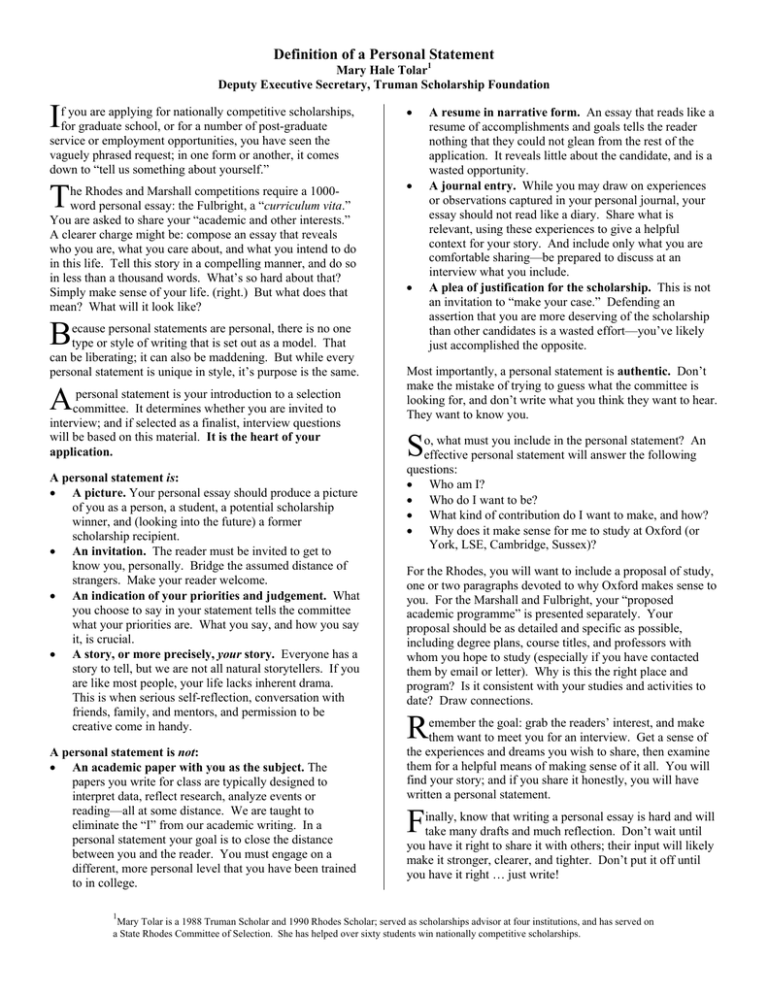
Definition of a Personal Statement Mary Hale Tolar1 Deputy Executive Secretary, Truman Scholarship Foundation I f you are applying for nationally competitive scholarships, for graduate school, or for a number of post-graduate service or employment opportunities, you have seen the vaguely phrased request; in one form or another, it comes down to “tell us something about yourself.” • T • B A resume in narrative form. An essay that reads like a resume of accomplishments and goals tells the reader nothing that they could not glean from the rest of the application. It reveals little about the candidate, and is a wasted opportunity. A journal entry. While you may draw on experiences or observations captured in your personal journal, your essay should not read like a diary. Share what is relevant, using these experiences to give a helpful context for your story. And include only what you are comfortable sharing—be prepared to discuss at an interview what you include. A plea of justification for the scholarship. This is not an invitation to “make your case.” Defending an assertion that you are more deserving of the scholarship than other candidates is a wasted effort—you’ve likely just accomplished the opposite. A Most importantly, a personal statement is authentic. Don’t make the mistake of trying to guess what the committee is looking for, and don’t write what you think they want to hear. They want to know you. he Rhodes and Marshall competitions require a 1000word personal essay: the Fulbright, a “curriculum vita.” You are asked to share your “academic and other interests.” A clearer charge might be: compose an essay that reveals who you are, what you care about, and what you intend to do in this life. Tell this story in a compelling manner, and do so in less than a thousand words. What’s so hard about that? Simply make sense of your life. (right.) But what does that mean? What will it look like? ecause personal statements are personal, there is no one type or style of writing that is set out as a model. That can be liberating; it can also be maddening. But while every personal statement is unique in style, it’s purpose is the same. personal statement is your introduction to a selection committee. It determines whether you are invited to interview; and if selected as a finalist, interview questions will be based on this material. It is the heart of your application. A personal statement is: • A picture. Your personal essay should produce a picture of you as a person, a student, a potential scholarship winner, and (looking into the future) a former scholarship recipient. • An invitation. The reader must be invited to get to know you, personally. Bridge the assumed distance of strangers. Make your reader welcome. • An indication of your priorities and judgement. What you choose to say in your statement tells the committee what your priorities are. What you say, and how you say it, is crucial. • A story, or more precisely, your story. Everyone has a story to tell, but we are not all natural storytellers. If you are like most people, your life lacks inherent drama. This is when serious self-reflection, conversation with friends, family, and mentors, and permission to be creative come in handy. A personal statement is not: • An academic paper with you as the subject. The papers you write for class are typically designed to interpret data, reflect research, analyze events or reading—all at some distance. We are taught to eliminate the “I” from our academic writing. In a personal statement your goal is to close the distance between you and the reader. You must engage on a different, more personal level that you have been trained to in college. 1 • what must you include in the personal statement? An So,effective personal statement will answer the following questions: • Who am I? • Who do I want to be? • What kind of contribution do I want to make, and how? • Why does it make sense for me to study at Oxford (or York, LSE, Cambridge, Sussex)? For the Rhodes, you will want to include a proposal of study, one or two paragraphs devoted to why Oxford makes sense to you. For the Marshall and Fulbright, your “proposed academic programme” is presented separately. Your proposal should be as detailed and specific as possible, including degree plans, course titles, and professors with whom you hope to study (especially if you have contacted them by email or letter). Why is this the right place and program? Is it consistent with your studies and activities to date? Draw connections. R emember the goal: grab the readers’ interest, and make them want to meet you for an interview. Get a sense of the experiences and dreams you wish to share, then examine them for a helpful means of making sense of it all. You will find your story; and if you share it honestly, you will have written a personal statement. F inally, know that writing a personal essay is hard and will take many drafts and much reflection. Don’t wait until you have it right to share it with others; their input will likely make it stronger, clearer, and tighter. Don’t put it off until you have it right … just write! Mary Tolar is a 1988 Truman Scholar and 1990 Rhodes Scholar; served as scholarships advisor at four institutions, and has served on a State Rhodes Committee of Selection. She has helped over sixty students win nationally competitive scholarships. Getting Started…. The personal statement comes from inside you, passionate and gutsy. Its composition is organic, a natural growth dictated by an obscure, internal logic. You don’t “make it up”; instead you listen. You “get it down.” First, you must trick your brain into letting you play. It wants everything nice and tidy, arranged in neat, labeled cubbyholes. Your artist brain is messy; like playing with finger paints. Lull your logic brain to sleep: Engage in mindless, repetitive activity. Turn off the TV and stereo; go for a run, do dishes, dig holes. Do anything that keeps you busy but allows your mind to wander. Be sure to keep a micro cassette recorder handy! Ideas may come thick and fast. Begin writing as soon as you wake up in the morning. Don’t shower, don’t eat (OK, you can have coffee), just turn on the computer. So you’re not fully awake; that’s good. Neither is your logic brain. Now do this everyday. Well, maybe not every single day; make appointments with yourself. You won’t have brilliant ideas each time. Some days you sit and stare at the computer screen. Nothing happens. You develop imaginary rashes that need immediate medical attention. You suddenly remember a test you should be studying for. But you sit there; you focus; eventually, an idea bubbles to the surface. You start writing. From Getting Creative with the Truman Personal Statements, written by Jane Curlin, Ph.D.; Director of Student Academic Grants & Awards, Willamette University; writer and consultant. An Exercise in Self-Reflection Reflect on some specific questions that may lead you to a more general expression of yourself. • • • • • • • What errors or regrets have taught you something important about yourself? When have you been so immersed in what you were doing, that time seemed to evaporate while you were actively absorbed? What ideas, books, theories or movements have made a profound impact on you – be honest. To what extent do your current commitments reflect your most strongly-held values? Where or how do you seem to waste the most time? Under what conditions do you do your best, most creative work? To what extent are you a typical product of your generation and/or culture? How might you deviate from the norm? (Taken from From a Faculty Representative: The Truman and Marshall Scholarship Processes As Educational Experiences, by Cheryl Foster, Ph.D., Associate Professor of Philosophy and Scholarships Coordinator at the University of Rhode Island)

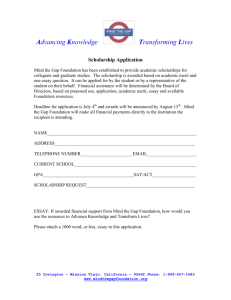
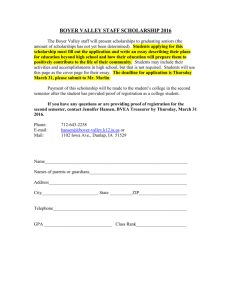
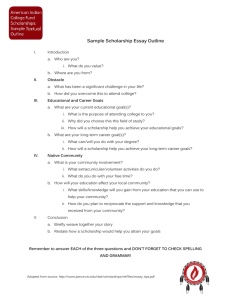
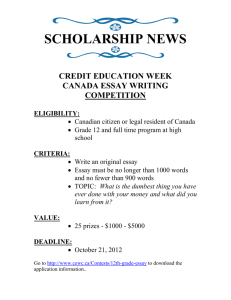
![Bourse Loran Scholarship [formerly the CMSF National Award]](http://s3.studylib.net/store/data/008459991_1-b0aaf3db7ad79ae266d77380f9da023a-300x300.png)